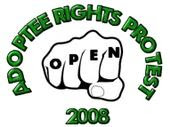 DES MOINES REGISTER,
DES MOINES REGISTER,Advocates of opening records pursue an anti-adoption agenda
As an adult adoptee and an adoptive parent respectively, we are concerned about the Register's publication of yet another adoption "open-records" editorial without acknowledgment of the underlying anti-adoption agenda being inadvertently advanced.
Every year during November, which is National Adoption Month, search groups and open-records advocates such as Concerned United Birthparents, Bastard Nation and the American Adoption Congress solicit the sympathetic ear of the media to initiate stories of the alleged identity confusion that they claim is the legacy of adoption. These groups have been lobbying Congress and the state legislatures for more than 25 years. Their stated agenda includes opening previously confidential adoption records and furthering an end to adoption for all but extreme cases of abuse and neglect.
The mutual consent registry is the only way to balance the difficult privacy questions that the states must answer such as: 1) Should the government open previously confidential adoption records? 2) If they are opened, how will the privacy rights once promised or implied be protected? 3) Given that some people desire to shed the confidentiality and some do not, how will the state balance the interests of both? One way to understand this balancing is to substitute "abortion decision" for "adoption decision" and imagine the outrage over opening those confidential records without consent.
Such mutual consent registries are a thorn in the sides of search activists in that they frustrate the desire of one party's unilateral access to search, contact or even pressure the other into a relationship they may not want. The term open records has the ring of progress, candor, lack of secrecy and other noble, forward-thinking values about it. But opening records without voluntary consent becomes an invasion of privacy, a violation of promises of confidentiality - an "outing," so to speak.
Media sensationalism has led many to conclude that all parties in adoption are searching. Yet statistics in states with registries tell the opposite story. A study out of the Annenberg School of Communications found that the media exaggerated by 18 times the number of actual "searchers."
The anti-adoption forces have enjoyed far greater success on the social/media front due to the unwillingness of reporters to dig beneath the surface and explore the agenda of these search advocacy groups. The one notable exception is Lucinda Franks in her New Yorker article around the time of the "Baby Jessica" case, when she exposed the role of these groups in the case. In addition, stories emphasizing grief, loss and pathology due to so-called identity confusion make far more interesting copy than those of content, secure adoptive families.
Search groups such as Bastard Nation promote the portrayal of adoption as a deceptive, hurtful and even pathological institution. The emphasis on adoption as setting in motion a lifetime of grief and loss has had a profound effect on adoptive placement in the United States. Today, fewer than 1 percent of young women experiencing problem pregnancies place for adoption. About half parent and half abort.
The persuasive emphasis on the centrality of search and reunion overemphasizes the loss, grief and emotional turmoil and underemphasizes the positive. Moreover, it promotes the agenda of a small, vocal, radical minority at the expense of our nation's children.
It also promotes poor public policy. Both the Safe Haven Acts and the Mutual Consent Registry (opposed by Bastard Nation, etc.) are good laws. They should be enhanced, not dismantled.
SUSAN BOWLAND, an adoptive parent, and CYNTHIA LATCHAM, an adult adoptee, are members of Adoption Advocates of Iowa.
Link to article








2 comments:
As a legal adult who is also adopted from the "great"" state of Iowa, I completely disagree. This IS a social issue, NOT a legal matter.
No one is granted complete "privacy" anymore, as the internet, social media, and information sharing is moving at a rapid pace. Remember the NSA is collecting this. So the "privacy" issue is nonsense.
Now, with that being said, an expectation to a "REASONABLY" amount of privacy is completely a different issue. The birth parent(s) can make a request to not be contacted.
We already have stalking laws, and harassment laws in the Iowa criminal code (section 700 in case your wandering), and is there a vast amount of adoptees disrespecting their own birth parents?
It's a violation of an adult adoptees personal right to know their family background, which ties into medical information (history and updates) and other personal information.
As adult adoptees, "we" should stop being treated as the "infant child" and be granted our rights. It really is a form of discrimination that was validated by the states. Ever hear of a truly non-profit adoption agency?
"One way to understand this balancing is to substitute "abortion decision" for "adoption decision" and imagine the outrage over opening those confidential records without consent."
Here's why that can't even be called logic.
Abortion is a medical reproductive decision that (our laws say) affects only the patient. Therefore there is a right to privacy.
Adoption is a parenting decision and legal process made after the birth of another individual who has separate rights from the parents.
Natural parents sign a legal relinquishment document that says NOTHING about guaranteeing their perpetual anonymity. Adoption agencies who promised or implied otherwise did so with NO legal basis for their claims. Courts examining challenges to open records laws have found there is no absolute right to familial privacy, and if you actually study why sealed records were implemented, you will learn that ADOPTIVE parents wanted a guarantee that the natural parents wouldn't be able to come "bother" them later with pesky concerns like wanting to know if the child they gave birth to was alive and well.
With the advent of social media and mail order DNA testing, it is downright ridiculous to even maintain the pretense that sealing records can in any way guarantee anonymity.
Thank God that more and more states are going back to open records.
Post a Comment